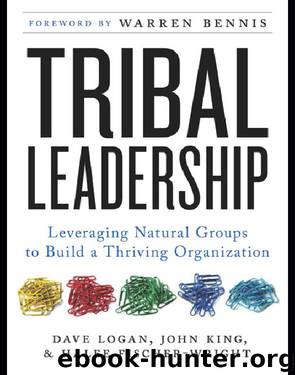Tribal Leadership by Dave Logan

Author:Dave Logan
Language: eng
Format: epub
ISBN: 9780061754722
Publisher: HarperCollins
PART III
Owning Tribal Leadership: Stabilizing Stage Four
CHAPTER 9
Core Values and a Noble Cause
When we first spoke with Gordon Binder, the former CEO of Amgen, he asked the same question almost every other Stage Four Tribal Leader asked: “Why do you want to talk with me?” He added, “I didn’t do anything.”
We asked him for a few hours of time to tell us the Amgen story from his perspective, so other leaders could learn from it. That was enough to convince him to talk with us to chronicle the story of how Amgen owned Stage Four—a story we had seen from inside as consultants to this historic company in the mid-1990s.
Early in Binder’s tenure, many people realized that the Amgen culture, as he told us, was “really good, far better than other companies.” He adds, “People said, ‘It makes my life more fun, and it’s effective. It’s good for me, good for the company, good for everyone.’”
Most, though, expected its “specialness” to end as its size kept doubling. He continued: “People would sit around trying to figure out if it would change [as the company grew]. When we passed fifty, or a hundred, or a thousand employees, they worried that we would lose our special culture. It was a frequent topic of discussion.”
Our memory of the early Amgen culture was high energy, dedication to the cause of curing disease, and focus on collective success. We overhead custodians—right along with research scientists and marketing staff—saying that their work was helping to cure cancer. It is almost impossible for us to convey that their words rang of genuine passion for their affiliation with Amgen, but they did.
During this time, a middle manager decided, without any formal authority, to record the Amgen culture. Binder recalls: “We hadn’t thought about the difference between values, principles, and so on. He wanted to write down what Amgen’s values were. He started talking with a lot of people to see if he could figure it out. When I found out about his project, I decided that it was too great to let him do it alone. We should get the whole company involved and really do this right.
“By the time we were done, we had individual interviews with about four hundred people, focus groups, and so on. It literally turned out there were eight [core] values, absolutely not seven or nine. Along the way, I concluded everything grew out of the values; the culture was based on them. If we could start with the values, everything else would follow.”
Identifying Values
A key point for companies that want to attain Stage Four is to go for values now. One of the most common misconceptions we heard in our research is that values is a topic for organizations that have a lot of money, and that struggling organizations should focus on the day-to-day tactics of survival instead. Almost without exception, we found that wildly successful organizations talked about values when it appeared they could least afford to do so. IDEO, Amgen,
Download
This site does not store any files on its server. We only index and link to content provided by other sites. Please contact the content providers to delete copyright contents if any and email us, we'll remove relevant links or contents immediately.
Hit Refresh by Satya Nadella(9138)
The Compound Effect by Darren Hardy(8969)
Change Your Questions, Change Your Life by Marilee Adams(7783)
Nudge - Improving Decisions about Health, Wealth, and Happiness by Thaler Sunstein(7707)
The Black Swan by Nassim Nicholas Taleb(7129)
Deep Work by Cal Newport(7085)
Rich Dad Poor Dad by Robert T. Kiyosaki(6633)
Daring Greatly by Brene Brown(6514)
Principles: Life and Work by Ray Dalio(6449)
Playing to Win_ How Strategy Really Works by A.G. Lafley & Roger L. Martin(6309)
Man-made Catastrophes and Risk Information Concealment by Dmitry Chernov & Didier Sornette(6019)
Big Magic: Creative Living Beyond Fear by Elizabeth Gilbert(5774)
Digital Minimalism by Cal Newport;(5765)
The Myth of the Strong Leader by Archie Brown(5508)
The Slight Edge by Jeff Olson(5418)
Discipline Equals Freedom by Jocko Willink(5390)
The Motivation Myth by Jeff Haden(5213)
The Laws of Human Nature by Robert Greene(5208)
Stone's Rules by Roger Stone(5088)
